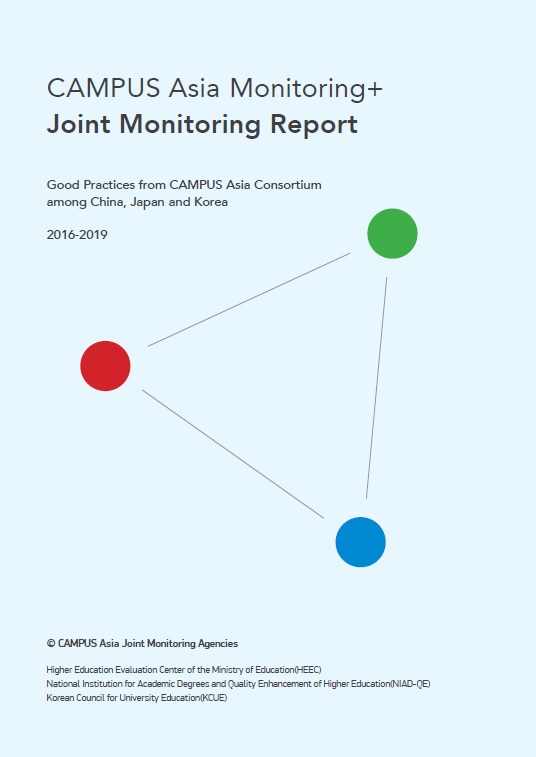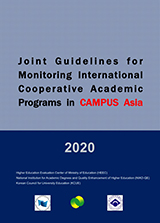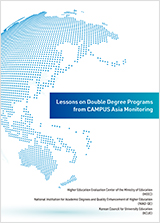
Monitoring+
Lessons on Double Degree ProgramsJoint GuidelinesJoint Monitoring ReportJoint Monitoring CriteriaImplementation Structure and Process
Under the banner of “Monitoring+ (plus)”, the quality assurance agencies of the three countries (NIAD-QE in Japan, HEEC in China, and KCUE in Korea) conducted monitoring on the "CAMPUS Asia" full-fledged (mode 2) programs in 2018-2019. Monitoring+ was conducted in accordance with the framework defined in the "Joint Guidelines for Monitoring International Cooperative Academic Programs in CAMPUS Asia"—guidelines developed based on experience accumulated through previously conducted monitoring efforts.
Joint Monitoring ReportJoint Guidelines Lessons on Double Degree Programs
Implementation Structure and Process
Lessons on Double Degree ProgramsJoint GuidelinesJoint Monitoring ReportJoint Monitoring CriteriaMonitoring+
Similarly to 2nd Monitoring, "CAMPUS Asia" Joint Monitoring Committee and "CAMPUS Asia" Joint Monitoring Panel comprised of academic experts/advisors and quality assurance agency
personnel of Japan/China/Korea with knowledge of internationalization of higher education and international joint education programs is established for Monitoring+.
The monitoring method implemented for Monitoring+ leveraged the foundation of mutual confidence that developed
between the three quality assurance agencies of Japan, China and Korea, with the quality assurance agency
equally assigned and confided to independently conduct monitoring on 3 of the 9 full-fledged programs each.
The Monitoring+ procedures are scheduled to be conducted as provided below.
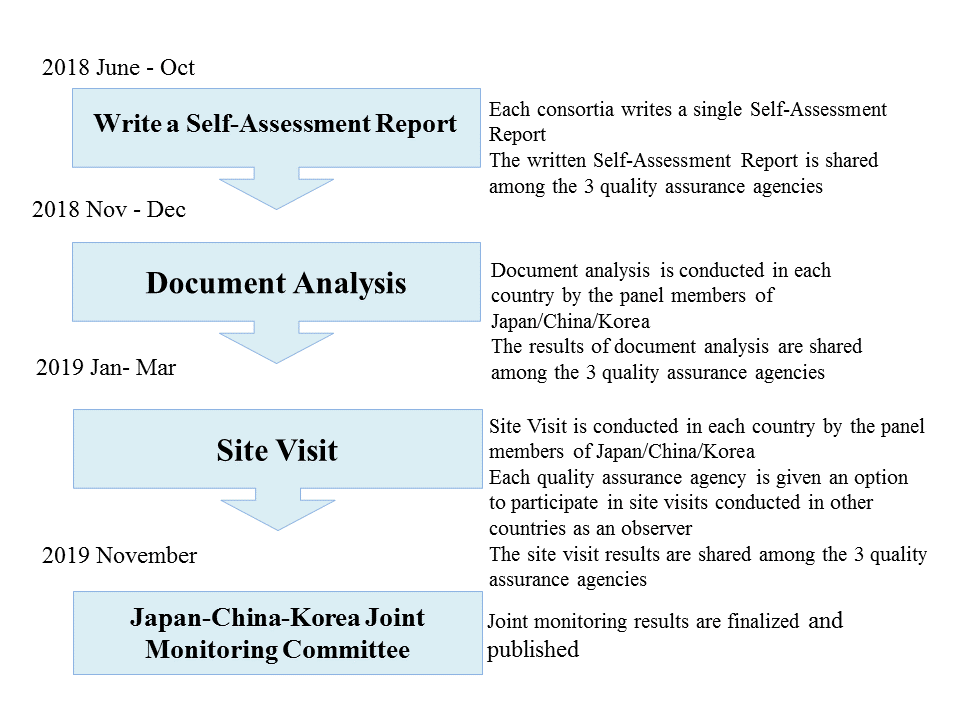
Joint Monitoring Criteria
Lessons on Double Degree ProgramsJoint GuidelinesJoint Monitoring ReportImplementation Structure and ProcessMonitoring+
The joint monitoring criteria of Monitoring+ is identical to the criteria of 2nd Monitoring, with exception to Criterion 5, which is now changed
to "Continuous Quality Improvement" and no longer includes any sub-criteria.
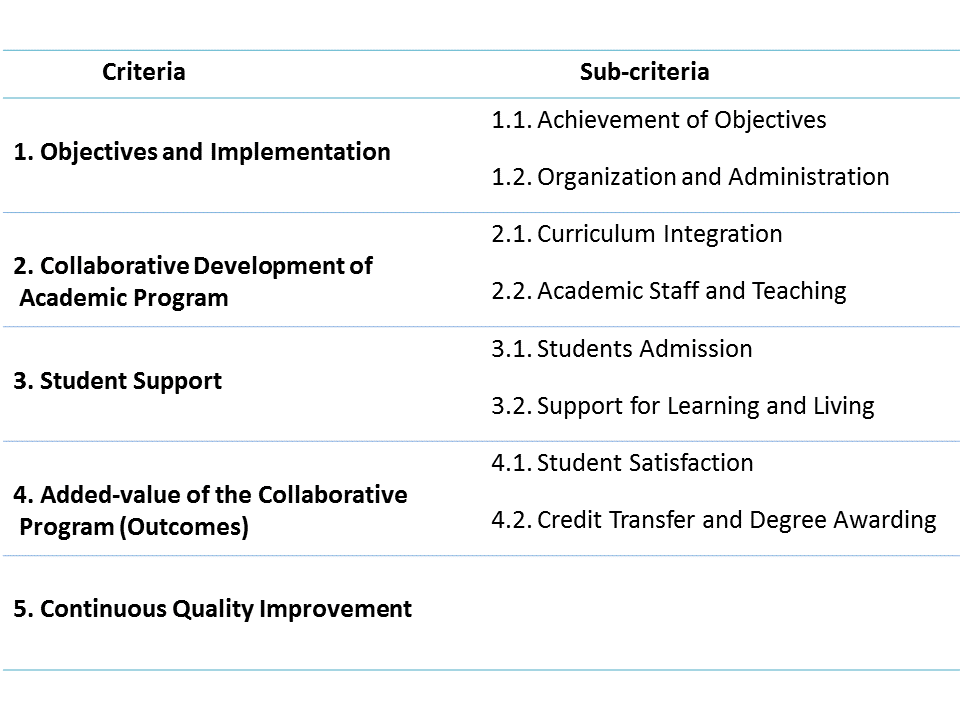
Joint Monitoring Report
Lessons on Double Degree ProgramsJoint GuidelinesJoint Monitoring CriteriaImplementation Structure and ProcessMonitoring+
CAMPUS Asia Monitoring+ Joint Monitoring Report (2019)
Compiled by the CAMPUS Asia Joint Monitoring Committee
The CAMPUS Asia Joint Monitoring Report is the final report for Monitoring+ that summarizes
the good practices identified in the "CAMPUS Asia" international cooperative academic programs
among Japan, China and Korea, as well as future initiatives posed for consideration
by the programs. The report provides a view into the monitoring activities—both present
and past—with the introduction of 104 good practices identified through the monitoring
activities of Monitoring+ and a look back at some of the good practices from the 2nd Monitoring.
Joint Guidelines
Lessons on Double Degree ProgramsJoint Monitoring ReportJoint Monitoring CriteriaImplementation Structure and ProcessMonitoring+
Joint Guidelines for Monitoring International Cooperative Academic Programs in CAMPUS Asia (Second Edition)
(National Institution for Academic Degrees and Quality Enhancement of Higher Education, Higher Education Evaluation Center of the Ministry of Education, Korean Council for University Education)
The Joint Guidelines for Monitoring International Cooperative Academic Programs in CAMPUS Asia (Second Edition) specify the criteria and methods for quality assurance of international cooperative academic programs based on the experience of three rounds of trilateral joint monitoring in Japan, China and Korea. The Guidelines is the revised version from the first edition, published in June 2017. The Guidelines specify not only the criteria and methods for quality assurance of general international cooperative academic programs, but also the actual initiatives of the Monitoring+ which was conducted in 2018-2019. Further, the Guidelines include useful contents such as common example of academic calendars for Japan, China and Korea. We hope the Guidelines would be asset to the members of higher education community, especially those who are engaged in international cooperative academic programs with quality assurance.
Lessons on Double Degree Programs
Joint GuidelinesJoint Monitoring ReportJoint Monitoring CriteriaImplementation Structure and ProcessMonitoring+
Lessons on Double Degree Programs from CAMPUS Asia Monitoring
(National Institution for Academic Degrees and Quality Enhancement of Higher Education, Higher Education Evaluation Center of the Ministry of Education, Korean Council for University Education)
Lessons on Double Degree Programs from CAMPUS Asia Monitoring focuses on the double degree program, which has been addressed as one of the important means of internationalization in Japanese universities in recent years. This publication summarizes the knowledge about double degree through the monitoring activities.
Further, this publication introduces examples of outstanding efforts from the CAMPUS Asia Monitoring+ Joint Monitoring Report as case studies. This publication specifies a background of the importance of double degree program and provides some hints of starting programs with the introduction of related systems of Japan, China and Korea.

